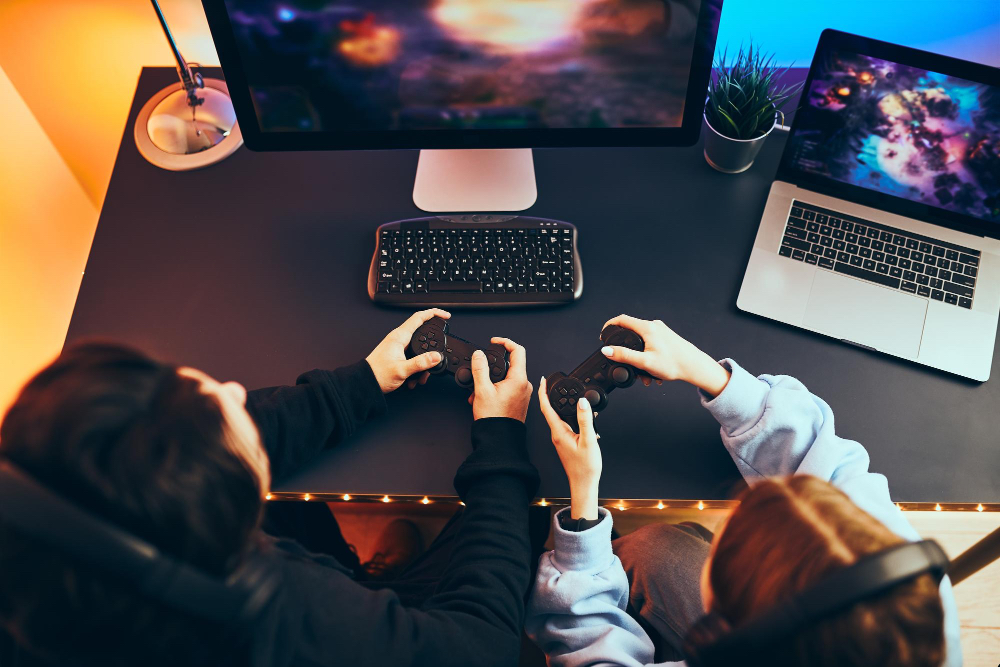You are sure to agree that computer games have long been evaluated as the top leisure – for children, teenagers, and adults. Gaming, as they say, suits all ages! This way, you can explore another world or try yourself in online battles. The problem is that even adults sometimes can hardly control their involvement. Meanwhile, this can become a real trouble for children and teenagers, interfering with their comprehensive development.
Nevertheless, psychologists and experts state that moderate gaming passion can stimulate growth and train team interaction along with imaginative thinking. But it is important to avoid dominance. All types of games require a proper approach from a sustainable development point of view! Thus, they can provide only positive emotions and do not harm our physical and spiritual health. So, how to balance your gaming addiction?

Post Contents
Financial Self-Control
According to Juniper Research, in 2025 the global turnover of the computer game purchasing market will reach $25 billion. What is this money spent on? Players buy game currency and use it to get additional features for their character – weapons, clothes, artifacts, abilities, skins, etc. It is important to control these expenses and not spend large amounts. This is also true in the iGaming industry $1 deposit will allow you to manage your bankroll and even be more likely to stick to it. Nodar Giorgadze, the top expert of the Gamblorium team, emphasizes that in this case, the financial risk is low, as the amount you venture to lose is initially small.
Moreover, additional paid gaming content became inevitable. The providers make their games free but monetize them through internal content. So, why are loot boxes discussed negatively? Some experts believe that their algorithms resemble slots’ mechanics. Thus, the player is captured by the excitement and spends large sums to hit the jackpot. But despite this, the situation is unlikely to change. Therefore, PC game players need to stick to a rational approach.
Mental Self-Control
Managing your mind is definitely a hard task. Preparing for every possible stressful situation in the game is a major challenge. As a result of increased stress, computer games can exacerbate negative emotions. The latter entails aggressive behavior and long-term depressed mood. Thus, organizing your daily routine plays an important role. When drawing up a schedule, it is recommended to allocate no more than two hours a day for computer games. Also be sure to try to find time for exercise, socialization with family and friends, and other hobbies.
Comfortable Space & Physical Activity
What is about your ergonomic environment? Does it suit your individual needs? One of the main tasks when playing is to take care of your back and overall body health. Namely, it is necessary to maintain a certain height for the monitor/table/chair, correct hand position, and distance to the screen.
Physical activity in daily life provides energy and supports strong muscles and bones. An active lifestyle in youth can reduce the risk of osteoporosis in later life. This is directly in line with the specific activities of gamers – as we know, people most often play PC games while sitting.
So, What is the Limit?
In general, it is recommended to spend about 2-3 hours a day in front of a PC screen. Professional eSports players most often exceed this time, but at the same time spend it efficiently and effectively – honing their skills within the specifics of a particular game. In addition, professional gamers pay great attention to ergonomics and regularly take warm-up breaks. In turn, children should spend less than 2 hours a day in front of the screen, especially on school days. Besides, regular breaks, warm-ups, proper nutrition, and good sleep will have a positive impact.
Single Player Story Games Can Be the Best Experience
The most popular for adults now are online battles – almost completely devoid of plot and concentrated on developing the skills and abilities of your character. Such sandboxes are great for entertainment after a hard day if we are talking about adults. For children, they are, in fact, time killers. It is much more profitable to offer the child a full-fledged interactive plot narrative – which will turn out to be an allusion to some fairy tales or adventures.
Current Development of the Gaming Industry
Why do analysts expect the gaming market to have a bright future with steady growth in revenue and user numbers? They follow several factors:
- The development of technology and the accessibility of gaming devices (we mean their cost reduction) ensures an increase in the number of players.
- A growing number of smartphone and computer users.
- Development of telecommunication networks ensuring stable Internet access.
- Release of AAA projects for game consoles.
- New trends in cloud games and VR spaces.
Besides, many game series released in previous years have found their loyal fans. Therefore, various sequels, remakes, and remasters of cult series often appear on the market. Some developers and suppliers go further. Instead of new games in a particular series, they create additional content for existing titles. Thus, Ubisoft has been releasing updates for games in the Assassin’s Creed series for a long time. Of course, all this maintains user interest and contributes to the growth of demand for PC games. However, the main task of a gamer is to keep a balance between gaming and his daily life.